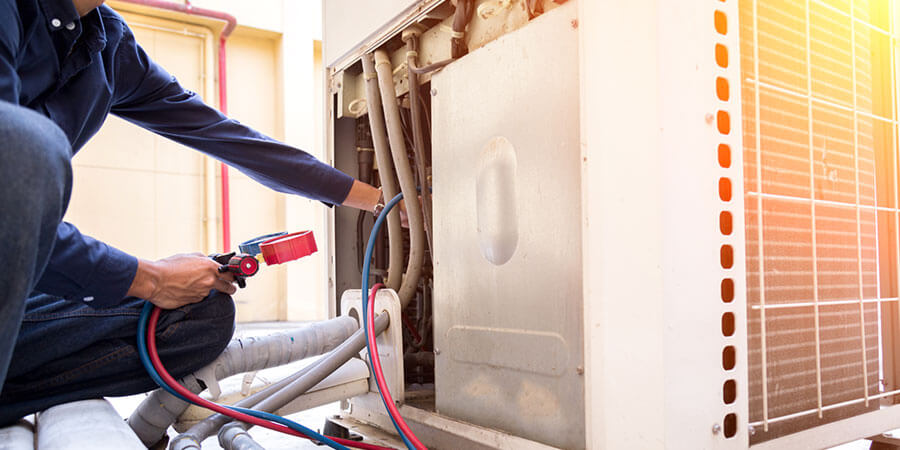Keep Your Home Cozy Year-Round with DMAKS HVAC Solutions.
Keep Your Home Cozy Year-Round with DMAKS HVAC Solutions.
Blog Article
Energy-Efficient HVAC Solutions to Minimize Utility Bills
As energy costs continue to rise, the importance of energy-efficient HVAC systems becomes progressively evident. These systems not only assure significant savings on energy expenses but also contribute to an extra lasting future by reducing energy intake.
Advantages of Energy-Efficient Heating And Cooling Systems
Energy-efficient HVAC systems offer various benefits that prolong past mere expense financial savings. By eating less energy, these systems add to lower greenhouse gas discharges, aiding to deal with climate adjustment and promote sustainability.
Furthermore, energy-efficient a/c systems frequently supply improved comfort levels. A number of these systems feature sophisticated innovation that allows for much better temperature level control and boosted air quality (DMAKS HVAC). This results in a healthier indoor environment, which is particularly vital for people with allergic reactions or breathing concerns
Additionally, spending in energy-efficient HVAC systems can improve building worth. As even more consumers prioritize energy performance, homes and buildings furnished with these systems might attract greater quotes in the property market.
Kinds Of Energy-Efficient Heating And Cooling Options
Just how can home owners and companies pick one of the most appropriate energy-efficient a/c alternatives for their needs? The market provides a selection of energy-efficient heating and cooling systems, each created to boost convenience while reducing power intake.
One alternative is the variable refrigerant flow (VRF) system, which effectively regulates the temperature in multiple zones within a structure. This system adjusts its cooling agent circulation to match the preferred temperature, bring about substantial energy savings.
One more preferred option is geothermal heatpump, which make use of the planet's steady temperature level to warm and cool spaces. By moving warm to and from the ground, these systems demonstrate excellent effectiveness, especially in moderate climates.
In addition, ductless mini-split systems offer an energy-efficient option for homes lacking ductwork. These systems permit zone-specific home heating and cooling, decreasing energy waste in empty areas.
Finally, high-efficiency heating systems and a/c, with innovative SEER and AFUE rankings, offer reputable climate control while consuming much less power than conventional versions. By assessing these alternatives, property owners and services can select an a/c system tailored to their details demands and power effectiveness objectives.
Key Functions to Think About

Next, investigate the kind of compressor made use of in the system. DMAKS HVAC. Variable-speed compressors can change their result to match the home heating or cooling down demand, bring about improved comfort and energy cost savings compared to single-speed versions. In addition, search for systems outfitted with smart thermostats that supply programmable settings and remote accessibility, permitting better control over power intake
An additional crucial feature is the system's air filtering capacity. High-efficiency filters can improve indoor air high quality and minimize power usage by ensuring the system runs effectively. Take into consideration the type of refrigerant utilized; contemporary systems often utilize environment-friendly refrigerants that have a reduced ecological influence.
Finally, make sure that the system is suitable with zoning innovation, which enables tailored temperature level control in various locations of your home, enhancing comfort while more info here lessening energy usage.
Tips for Selecting the Right System


Following, think about energy performance rankings, specifically the Seasonal Energy Effectiveness Ratio (SEER) for cooling down systems and the Yearly Gas Application Effectiveness (AFUE) for heater. Greater ratings indicate better efficiency, which can cause substantial savings on utility bills in time.
In addition, evaluate the kind of heating and cooling system that ideal matches your way of life and budget. Alternatives include air conditioning, ductless mini-splits, and warm pumps, each with its very own collection of benefits and disadvantages.
Don't overlook the significance of correct setup and sizing; an inaccurately sized system can lead to inadequacies and increased wear. Finally, seek advice from a specialist a/c professional to get professional recommendations tailored to your home's distinct needs. This comprehensive strategy will certainly make sure that you select an energy-efficient a/c system that meets your requirements and spending plan efficiently.
Upkeep for Ideal Performance
As soon as the right heating and cooling system remains in area, ongoing maintenance comes to be crucial to making sure optimal performance and longevity. A well-maintained system runs better, resulting in lower energy consumption and minimized utility bills. Regular inspections and tune-ups need to be set up at the very least two times a year-- when prior to the cooling period and once before the home heating season.

Home owners should also be vigilant regarding monitoring their heating and cooling system's performance. Unusual noises, fluctuating temperature levels, or increased energy costs can indicate underlying concerns that require prompt attention. By attending to these issues without delay, home owners can stop pricey repair work and extend the life expectancy of their systems.
Purchasing a maintenance strategy with a certified technician not only enhances efficiency yet also supplies satisfaction, recognizing that the system is operating at its best. DMAKS HVAC. Regular maintenance is for that reason vital for maintaining energy efficiency and decreasing general functional expenses
Verdict
Finally, energy-efficient cooling and heating systems offer a feasible service for minimizing utility costs while improving convenience and air top quality. By including innovative innovations and options such as geothermal heatpump and ductless mini-splits, residential or commercial property owners can attain considerable energy savings and add to environmental sustainability. Cautious factor to consider of system functions and continuous maintenance additionally makes sure ideal performance, making energy-efficient systems a prudent investment for both economic and ecological benefits.
Report this page